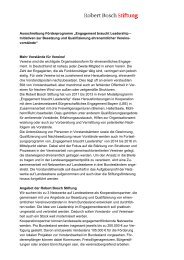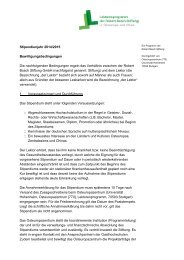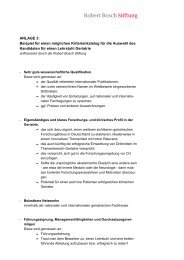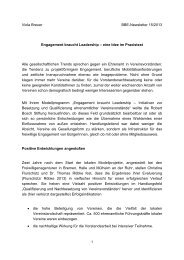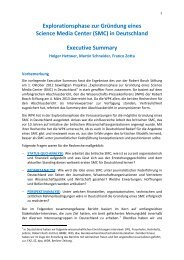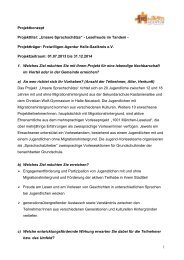Turkey, Its Neighbors and the West - Robert Bosch Stiftung
Turkey, Its Neighbors and the West - Robert Bosch Stiftung
Turkey, Its Neighbors and the West - Robert Bosch Stiftung
You also want an ePaper? Increase the reach of your titles
YUMPU automatically turns print PDFs into web optimized ePapers that Google loves.
as shown in Table 2, about 3.4 million people with Turkish<br />
background live outside <strong>Turkey</strong> today, an increase of about 1<br />
million people since 1985. While <strong>the</strong> total has not changed<br />
much since <strong>the</strong> mid-1990s, <strong>the</strong> geographical distribution<br />
has. In <strong>the</strong> mid-1990s, about 86 percent of Turkish migrants<br />
abroad lived in europe. Today this share has declined to about<br />
80 percent. Turkish citizens have emigrated increasingly to<br />
<strong>the</strong> former soviet republics or to <strong>the</strong> Middle east. flows to<br />
<strong>the</strong>se two destinations, however, remain relatively small (2.2<br />
percent <strong>and</strong> 3.2 percent, respectively, of all Turkish migrants<br />
abroad in 2008).<br />
The change in incoming flows has been more dramatic.<br />
The number of foreigners arriving in <strong>Turkey</strong> has more than<br />
doubled in recent years, from about 10.4 million in 2000<br />
to 25.6 million in 2009. During this period, more than 182<br />
million foreign nationals entered <strong>Turkey</strong>, double its current<br />
population. a breakdown of foreigners entering <strong>Turkey</strong> (see<br />
figure 1) shows that most still come from eu member states.<br />
however, entries from neighboring countries, especially<br />
from <strong>the</strong> former soviet republics, has steadily increased.<br />
In contrast to <strong>West</strong>ern european entrants coming for visits<br />
or tourism, <strong>the</strong>se people often come to <strong>Turkey</strong> to engage in<br />
“suitcase trade,” pursue seasonal labor, or gain employment<br />
in private households. Tourism has started to play a greater<br />
role with respect to entries from russia. With <strong>the</strong> exception of<br />
Iran, <strong>the</strong> number of entries from <strong>the</strong> Middle east have been<br />
relatively low, but rising steadily.<br />
To <strong>the</strong>se impressive numbers of people entering <strong>Turkey</strong><br />
temporarily for leisure, business or work, one should add<br />
<strong>the</strong> approximately 250,000 people who enter <strong>Turkey</strong> each<br />
year with <strong>the</strong> intention of staying longer, be it for education,<br />
employment, or retirement. 3 There are also a growing number<br />
of nationals from <strong>the</strong> neighborhood who enter <strong>Turkey</strong> legally<br />
but <strong>the</strong>n overstay <strong>the</strong>ir visa <strong>and</strong> work illegally. In addition,<br />
<strong>Turkey</strong> has also become a country of transit migration toward<br />
<strong>West</strong>ern europe. While it is difficult to estimate <strong>the</strong>ir true<br />
numbers, <strong>the</strong> Turkish government apprehended approximately<br />
700,000 illegal migrants between 1998 <strong>and</strong> 2008. asylum<br />
seekers, mainly from Iran, Iraq, <strong>and</strong> afghanistan, are also<br />
entering <strong>Turkey</strong>: almost 60,000 between 1995 <strong>and</strong> 2008.<br />
These changes in <strong>the</strong> number, type, direction, <strong>and</strong> motivation<br />
of people entering <strong>and</strong> exiting <strong>Turkey</strong> have also had a marked<br />
impact on relations with its neighbors.<br />
C H A P T E R2<br />
11





